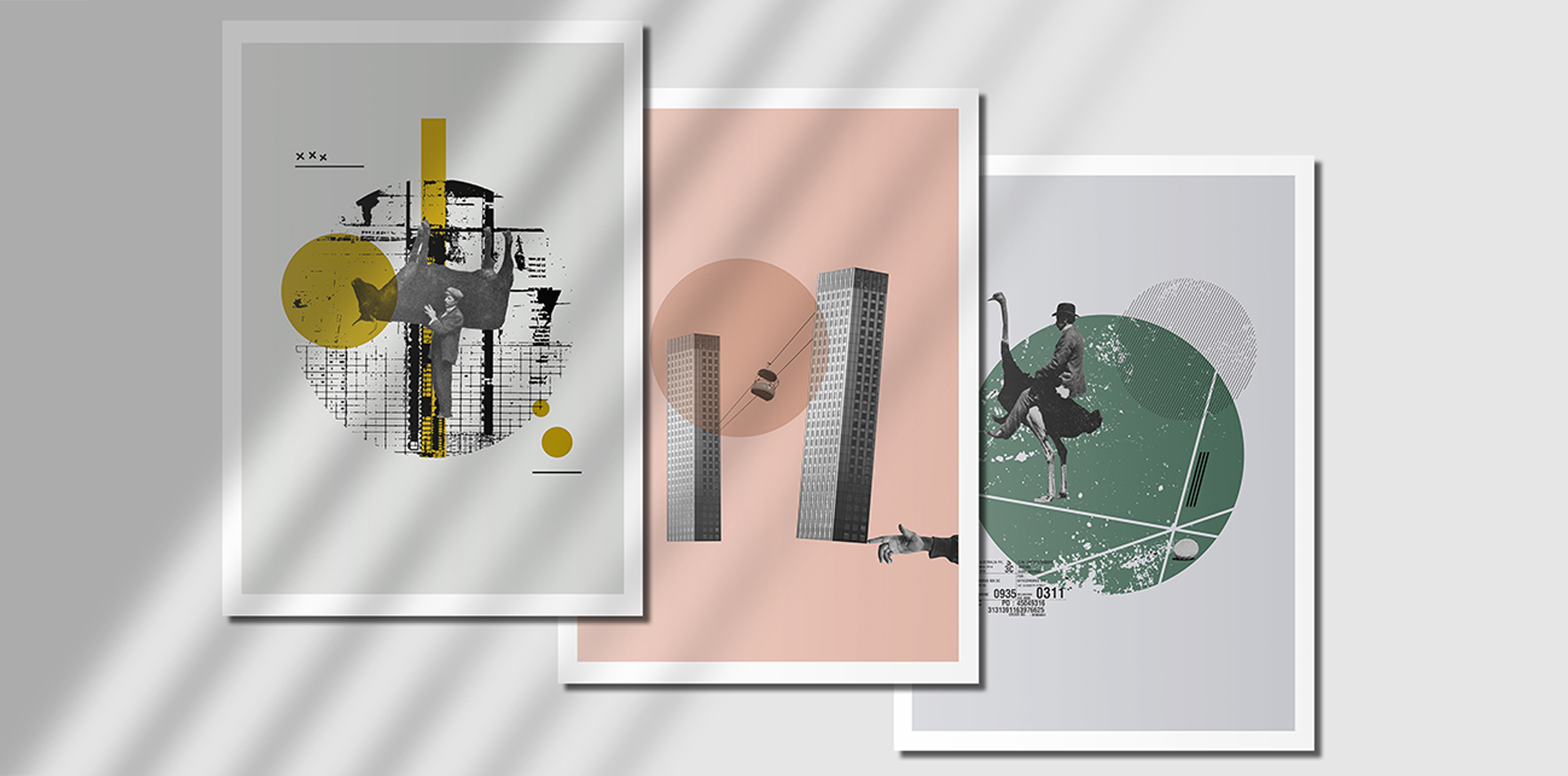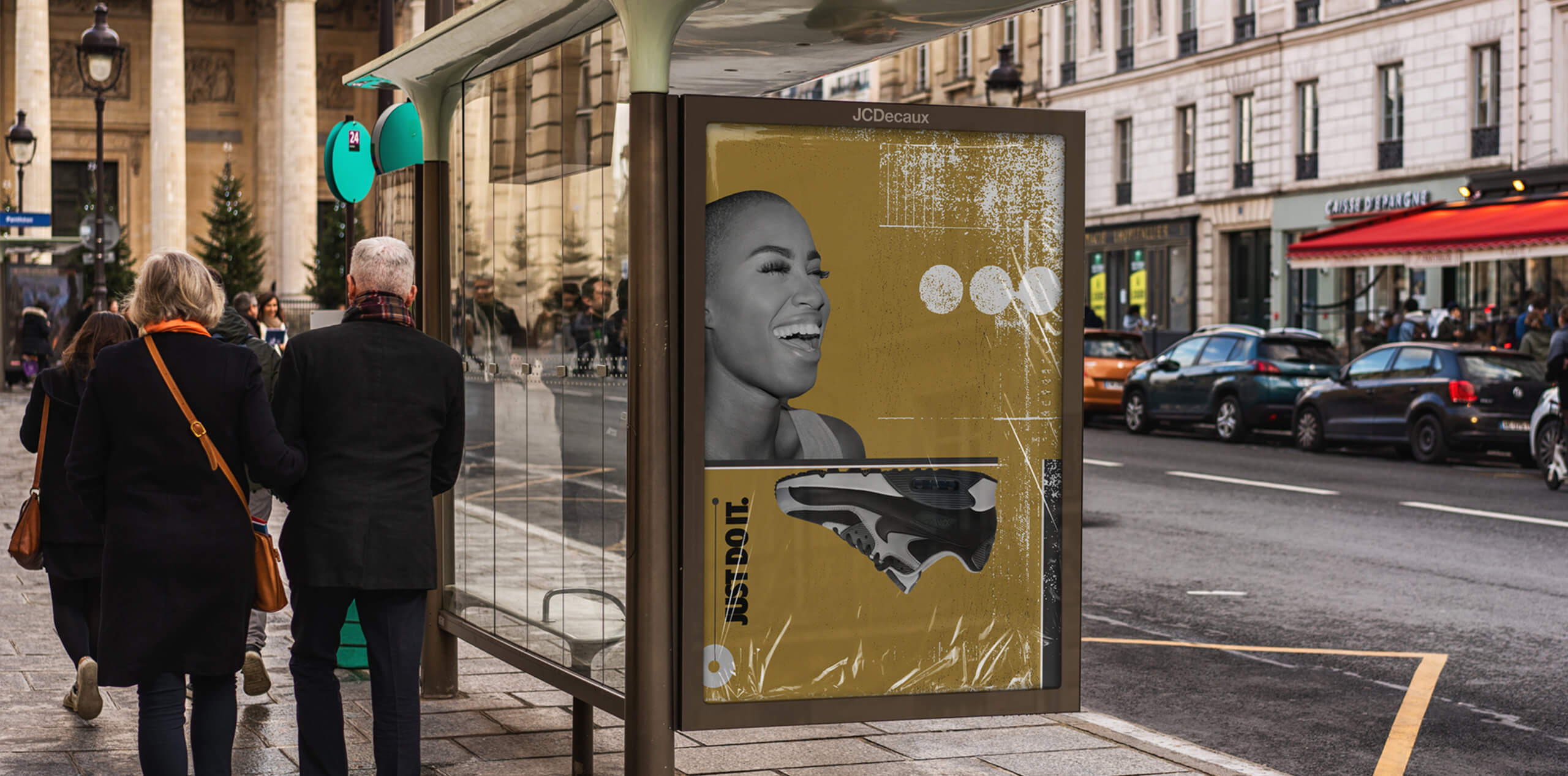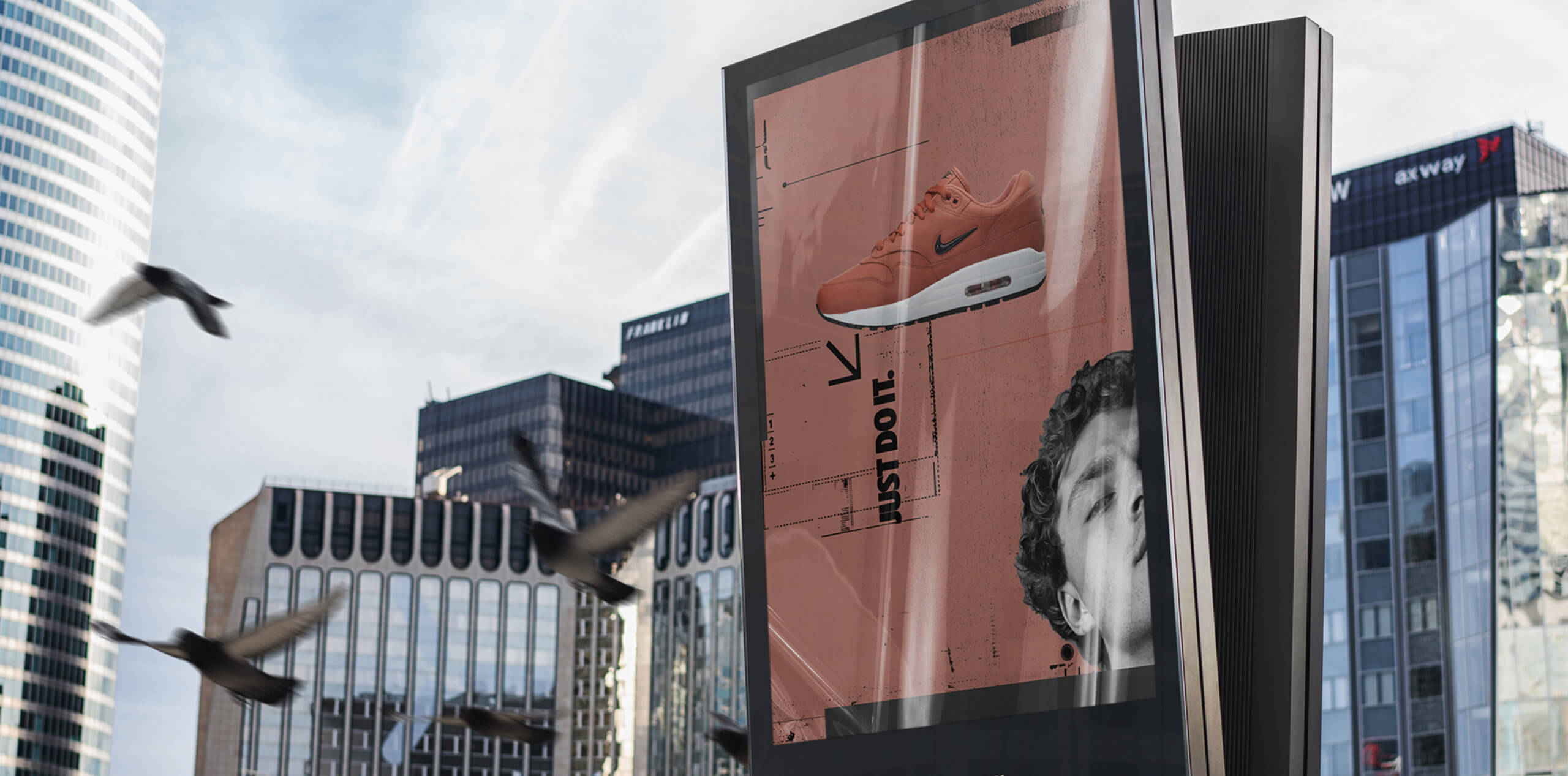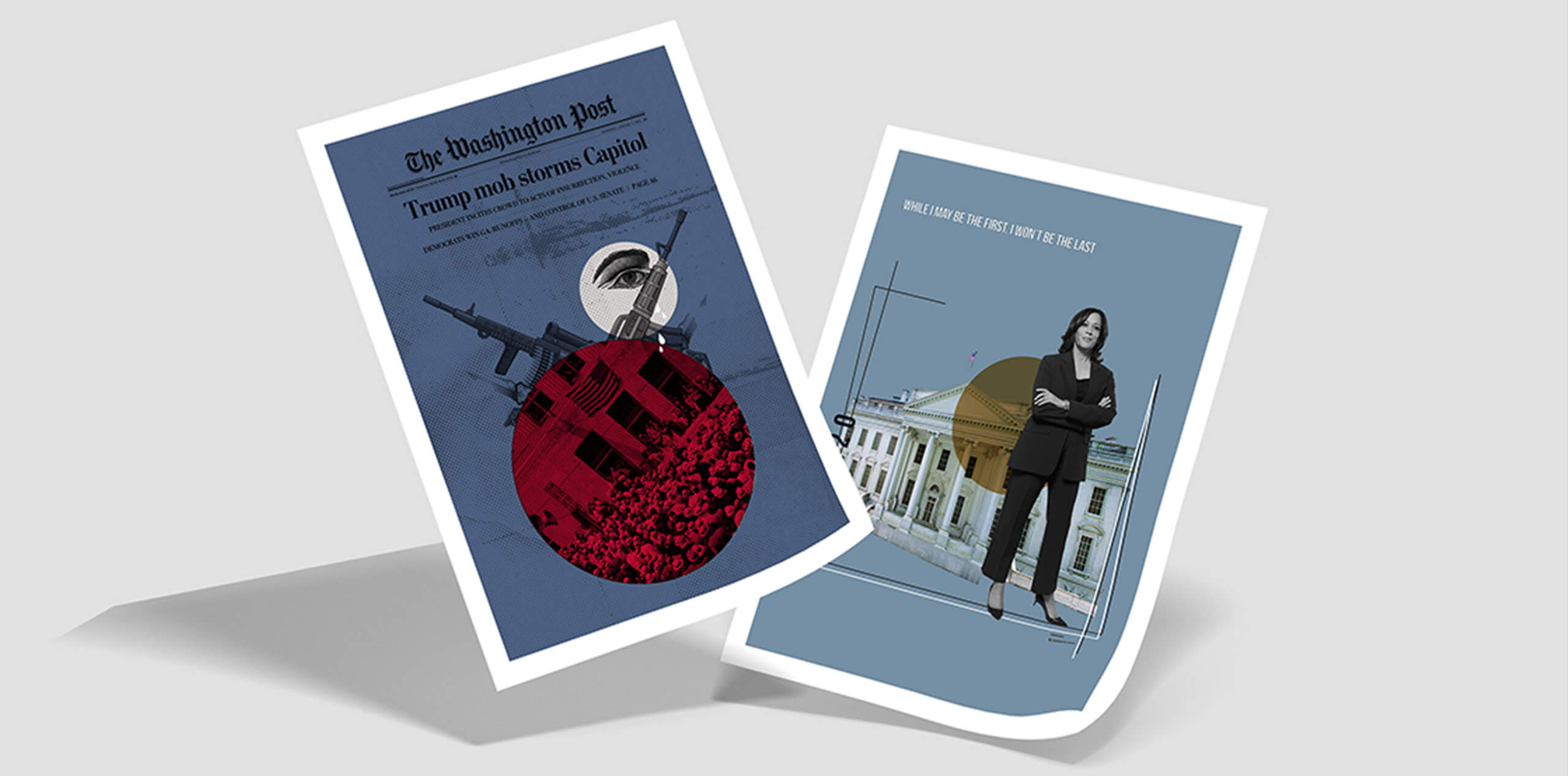Barbara Gibson completely changed the course of her life when she gave up a successful 25-year career as an accountant and followed her creative instincts to become an illustrator and collage artist. In 2013, she graduated from Warsaw School of Photography and Graphic Design and the following year relocated to Birmingham UK, where she set up a photography studio with her wife, professional photographer Marta Kochanek. Her work has been exhibited internationally and her clients include Nike, HSBC, Birmingham Royal Ballet, and New Statesmen magazine. She had her first exhibition Fertile Ground alongside collage artist Mark Murphy at the Argentea Gallery in Birmingham in 2019.
Barbara has always been creative. She first found an outlet for this by taking photographs of the urban scene in Warsaw, Poland, and then in Birmingham after her move there. She invested time developing new techniques and practices and began to manipulate her images, which led her to illustration and collage. She often creates socially-engaged compositions using vintage images from mid-twentieth century magazines. The majority of her work is “made out of overlooked pieces of paper, old letters, images, documents or parts of other ephemera.” Being a self-taught artist has helped Barbara to develop a unique visual style and make work that is both playful and thought-provoking. Most of her research involves reading, alongside building a digital archive of scanned imagery and images discovered through online sources.
Working directly with clients, advertising agencies and magazines. Barbara creates bespoke artworks in response to a variety of project briefs. Her first high profile project came in 2018 when she was commissioned by HSBC to work on a campaign to support and unite the LGBT community through colour, art and collaboration, producing images that were displayed on HSBC shop fronts and the side of buses. She was also commissioned by an advertising agency to work on the concepts for several large billboards advertising the Mailbox in Birmingham, culminating in 48 billboards and digital screens displayed across the city.
As well as working on commercial commissions, Barbara creates her own personal artwork of collages and illustrations which she exhibits and sells as prints. In this work, lets her imagination run free and experiments with digital technologies to see where they will take her.

We chatted with Barbara to find out more about what motivated her to take the plunge and completely change her career path and to discover her sources of inspiration.
How have you grown over time and developed throughout your career?
Discovering my passion and following my creative dreams no matter what made me a new person. I risked everything, not only my home and career in Poland but also all my savings. I did not even speak English when I first moved to the UK. But I was in love and also had the desire to change something in my life. I took the chance and there was no way back.
After moving to the UK, I signed up for an English course at a local college and became comfortable in speaking and writing within two years. I worked on my portfolio, researched, and read books and also experimented endlessly developing new techniques. After a lot of hard work, I was finally able to show my work to the world as well as hold a conversation with people and discuss what I was working on. I got my first big commission from HSBC in 2018 and was then invited to exhibit in the Argentea Gallery in 2019. This is when things started to really kick off.
Do you think being self-taught has allowed you to develop more of a unique personal style?
I’m naturally a curious person and once I get an interested in something, I give it 100%. Discovering new things is a wonderful aspect of being a creative. Appetite grows with eating – the more I eat the better it tastes. I am still developing my style and it’s not yet completely refined.
Where do you get your inspiration from and how do you approach a new project?
For my personal work it depends on the materials that I’m working with. It might be magazines I see on flicker, online archives or a topic I have an interest in. It can also be an interesting colour or shape I see or make or an article I read. I often just cut and scan materials to add to my digital archive.. It’s a bit different with commercial work because then I work to a brief and look into more specific materials to create mood board, colour pallet and drafts.
How do you get advertising commissions and promote your work?
There is no magic to it. Through hard work, constant development and being focused I make my work visible. I talk to people and am usually recommended through word of mouth.
How has being a woman impacted your career?
Since I started in my creative career, I’ve found that I have only been judged on my portfolio. I haven’t noticed any disadvantages in being a woman or had any negative experiences. It’s something I hope to never experience, as I believe we are not here to be enemies and we should learn from those we consider more experienced than ourselves regardless of their gender.
In your experience, do you think there is equality and diversity across the creative industries today?
No, in general I don’t think there is equality. But I think it can be influenced by many factors.
I started my career in the creative industries in my late 40s. Not working in that sector before can perhaps be put down to me not being confident enough to take that step. Not having the opportunity to decide early on what makes me happy and having the safety bubble of a successful career in something I did not enjoy but that gave me a good salary reduced my sense of possibility. These were the factors that held me back, but perhaps other women have kids or different career choices to make.
If the creative industries in general are dominated by men, there can be many explanations of this. Having more women who speak out will make it more vibrant and equal. This will definitely inspire new generations of women to believe in their talents and believe that there is a place for them too.
A lot of people in the creative industries struggle with imposter syndrome and self-doubt. Have you experienced this and how do you deal with it?
I’ve experienced it and it’s not something I’ve completely freed myself from but something I continually work on. Being a foreigner in the UK who is still developing an understanding of the industry so as to face day-to-day challenges such as not being paid on time – all these things effect how we feel as creatives. This can cause people to start doubting their talents. I wasn’t raised in an environment where people around me told me that I was good at anything. I think the new generation of parents are more sensitive in that respect. The more I doubt myself, the more research I undertake to develop my skills. I guess that is the way I deal with self-doubt. I keep improving, gaining knowledge and developing skills.
Do you have any words of advice for women considering a career in the design industry today?
My advice would be to invest time into creating a good portfolio. Also, never stop working even if you feel you’re not in the right mood because each mistake or temporary lack of creativity brings an opportunity to discover or learn something new. There are days I am unhappy with whatever I do. But then when I look at a piece from a different perspective, I often realise that I used a different tool or made something unusual. So, even if I don’t end up with a final piece I am happy with, I know that at least I used my time learning or investigating. Don’t be too hard on yourself, just keep your chin up as tomorrow brings new opportunities. Just use the time you have and be thankful. Smile, be creative, and collaborate!
Where do you see yourself in 5 years’ time?
I would love to continue working for myself from the space I’ve created at home. Working from home, especially during the lockdown, made me realise that I really enjoyed my daily routine keeping myself busy with projects and commissions.
If I was to plan 5 years ahead – I would be over 50 then – my biggest dream would be to balance a reasonably successful career with time dedicated to my family.
- Marta Kochanek – Advertising and Fine Art Photographer / Producer and Educator martakochanek.com
- Jane Anderson and Ally Standing – Educators / Graphic Communication and Contextual Studies @_lucky_pablo
- Zoe Robertson – Designer Maker / 3D Design zoerobertson.co.uk / dual.works




